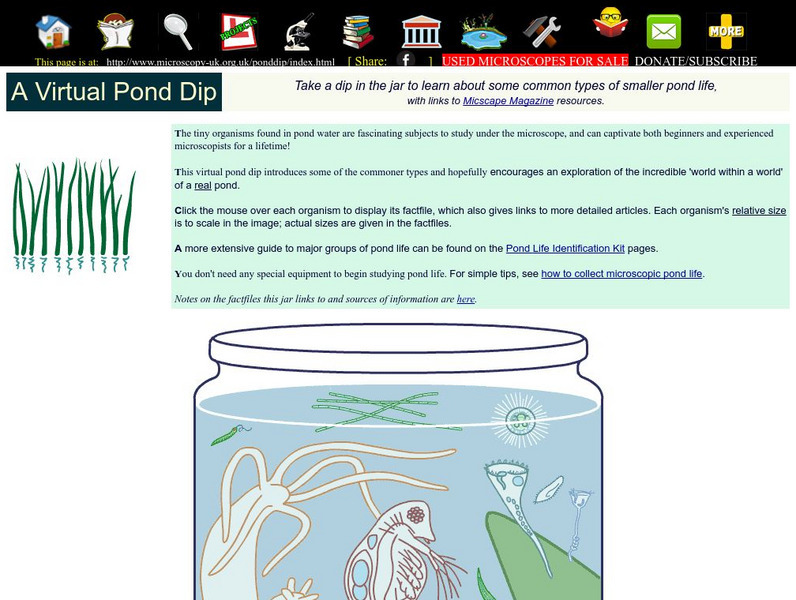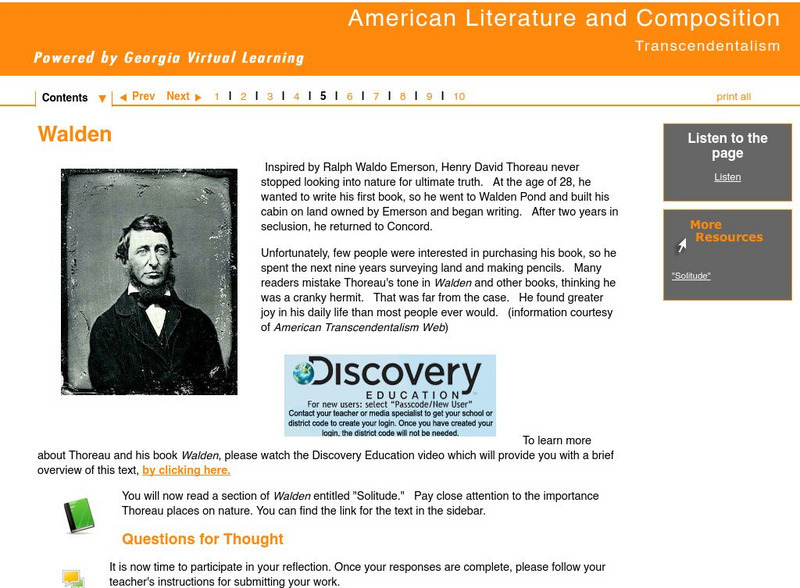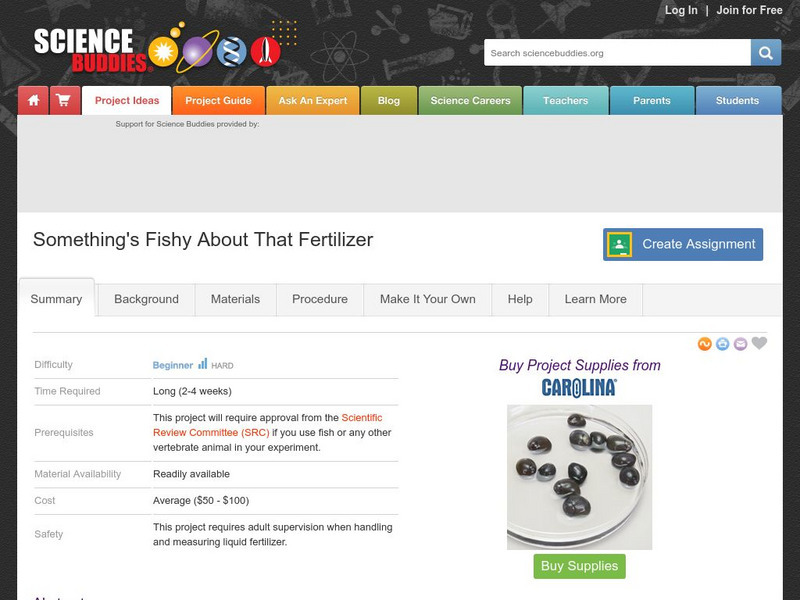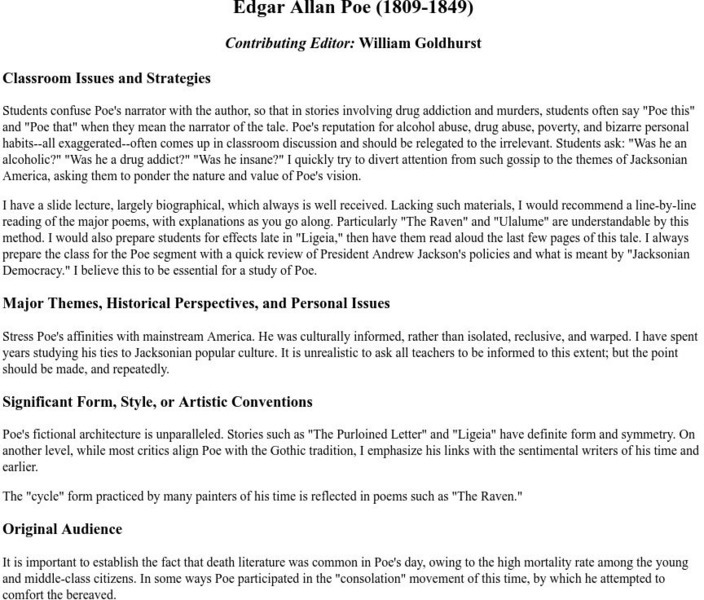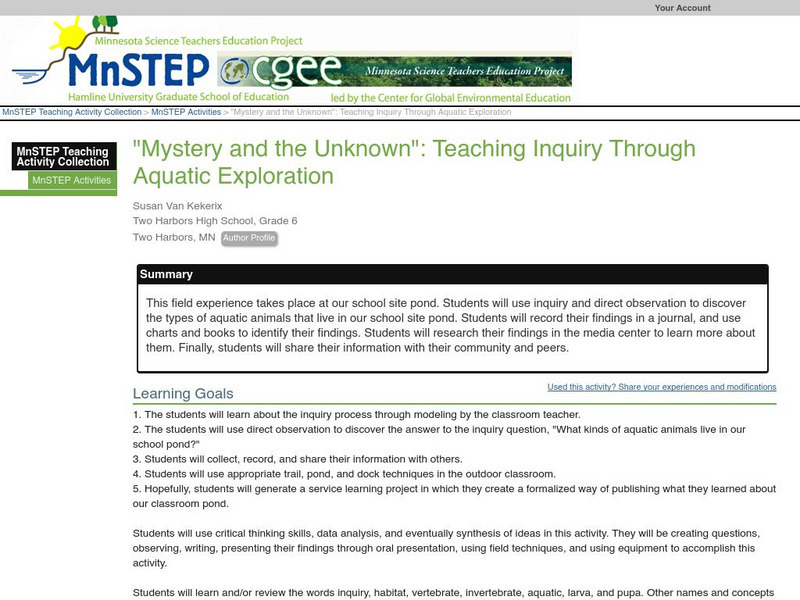It's About Time
The Nitrogen and Phosphorous Cycles
How do we affect the ecosystem, and what can we do to preserve it? Pupils explore chemicals that promote and inhibit plant growth, then discuss the importance of nitrogen and phosphorus to the survival of organisms and describe how...
Curated OER
Does cloud type affect rainfall?
Student use MY NASA DATA to obtain precipitation and cloud type data. They create graphs of data within MY NASA DATA. Students compare different cloud types, compare precipitation, and cloud type data They qualitatively describe graphs...
Curated OER
Macroinvertebrate Sampling
Students identify macroinvertebrate species to investigate ecological systems and the relationship between humans and the environment.
Curated OER
Translations, Reflections, and Rotations
Students are introduced to the concepts of translation, reflection, and rotation. They practice translating, reflecting, and rotating two-dimensional objects on the coordinate plane. students use computers to learn about the three concepts.
Curated OER
Critter Clues
Students work together to examine water quality. They identify the indicators of water quality and complete an experiment. They discuss their results.
Curated OER
Does Cloud Type Affect Rainfall?
Student uses MY NASA DATA to obtain precipitation and cloud type data. They create graphs of data within MY NASA DATA. They compare different cloud types as well as precipitation types. They describe graphs of the precipitation and cloud...
Curated OER
The Effects of Temperature Variations on the Heartbeat Rate of Daphnia
Learners use DigiScope technology to investigate Daphinia, popularly known as water fleas. They design, conduct, and report on an experiment to determine the effects of varying water temperatures on the heartbeat rate of Daphnia.
Environmental Education for Kids
Eek!: Water Critter Key Life in a Pond
Use this interactive key to identify a critter that you found in the water. Expand it to full-screen for the best experience.
Science Education Resource Center at Carleton College
Serc: Mn Step: Who Am I? Plant and Animal Life in a Pond
After learning about pond life, learners play a game where they must ask questions to discover the name of an animal or a plant displayed on a card placed on their backs. A set of images, a questioning sheet, and a list of vocabulary...
Microscopy UK
Microscopy Uk: A Virtual Pond Dip
In this site, you will be introduced to some of the more common organisms found in a pond. Contains a thorough guide to small and microscopic pond life with links to other descriptive sources.
National Council of Teachers of Mathematics
Nctm: Figure This: How Many Fish in the Pond?
Can you figure out how many fish are in a pond? Use the statistical method of capture-recapture and estimation to solve this math challenge. An investigation from the NCTM Math Challenges for Families series. Discover how this skill can...
Georgia Department of Education
Ga Virtual Learning: American Literature: Transcendentalism: Walden
This lesson from a unit on American Transcendentalism focuses on Henry David Thoreau's Walden, a book about his living a frugal life in a secluded life in a cabin on Walden Pond. Links are provided to a Discovery Education video about...
Biology Corner
Biology Corner: Biodiversity of Ponds
In this lesson plan site, students will observe and record data on three ponds. The goal is to identify the types of organisms in each pond and prepare a report that delves into the biodiversity of each site. Links to videos about pond...
EL Education
El Education: The Pond Alphabet Book
Students make observations and collect specimens in a local pond and then create an alphabet field guide to demonstrate what they have learned. Alphabet pages are illustrated with original watercolor paintings.
Science Buddies
Science Buddies: Something's Fishy About That Fertilizer
Did you know that when you use fertilizer in your garden, it can eventually reach a lake, stream, or pond? There are many different chemicals present in fertilizers. Learn how they affect the aquatic organisms in the ecosystem within...
Georgetown University
Georgetown University: Edgar Allan Poe (1809 1849)
This site is a professor's guide for students. This guide features information on how to distinguish between Poe and his narrators in his stories.
Eserver
E Server: The Thoreau Reader: Thoreau Chronology
This resource offers a detailed chronology of Henry David Thoreau (1817-1862 CE). Give information on his life, writings, and lectures.
Science Education Resource Center at Carleton College
Serc: "Mystery and the Unknown": Teaching Inquiry Through Aquatic Exploration
This field experience takes place at our school site pond. Students will use inquiry and direct observation to discover the types of aquatic animals that live in our school site pond. Students will record their findings in a journal, and...
Other
Claude Monet's: Works of Claude Monet
View 85 representational works of the artist. Each painting is titled and dated, and is supplemented with either a description or a quote from the artist. Written in both English and French (available from homepage).
Florida State University
Florida State University: Collotheca (Rotifera) Movies
Select from one of two movies which depict a rotifer feeding while traveling slowly in pond environment. Background information is provided on rotifers in this interesting site.
Eserver
E Server: The Thoreau Reader: Thoreau: Genius Ignored
An in-depth biography of Henry David Thoreau. Includes information on nearly every known period of his life, including his life at Walden and his essays and writings.
EL Education
El Education: Field Guide to the Aquatic Gardens at Forest Park
3rd grade students in Springfield, Massachusetts created this field guide as part of a learning expedition on ecosystems and pond life. Students did fieldwork in the city park and worked with local experts, closely examining the ponds....
BiologyWise
Biology Wise: Facts About Daphnia (Water Fleas)
Describes the physical characteristics of Daphnia, their importance as a food source for freshwater fish, their diet, life cycle, and methods of reproduction. Offers tips for how to start and maintain a colony of Daphnia that can be used...










